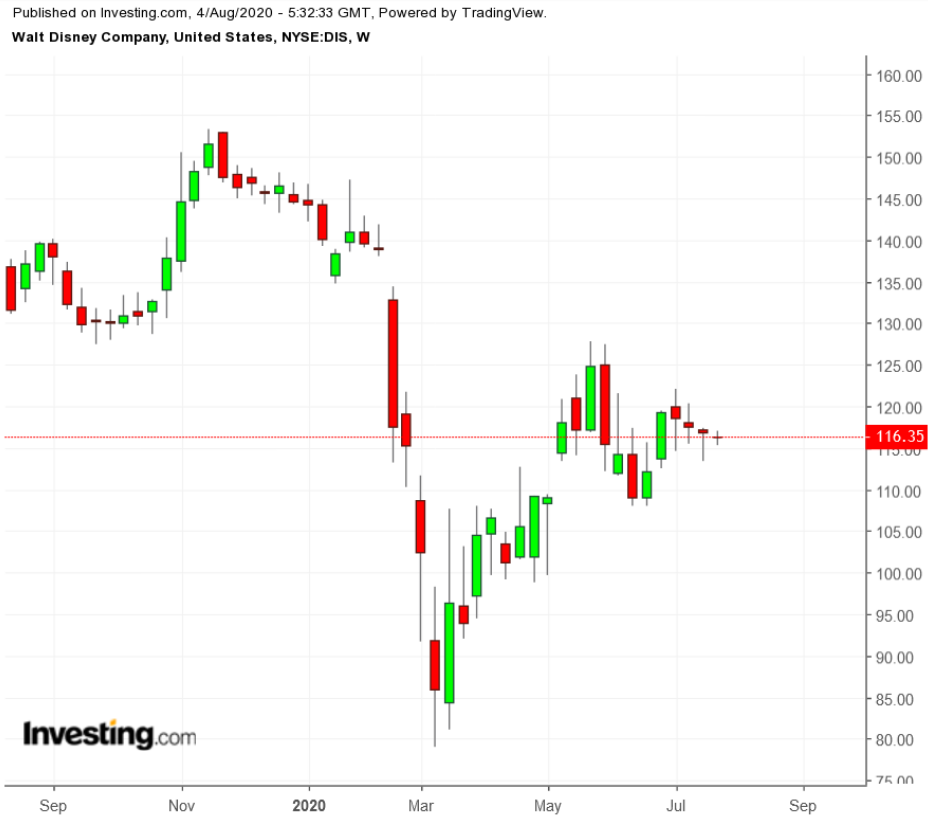- Reports Q3 2020 earnings on Tuesday, August 4, after the close
- Revenue Expectation: $12.4B
- EPS Expectation: -$0.61
It’s difficult to come up with a good reason to buy shares of the Walt Disney Company (NYSE:DIS) right now. COVID-19 continues to deprive the Burbank, CA-based company of its main sources of revenue: its iconic theme parks are deserted, while film and TV production is almost non-existent.
Investors will get a good understanding of the extent of the damage the pandemic has incurred on this entertainment giant’s sales when the company reports earnings for the April-to-June quarter later today. That was the period when its US resorts were shut down and international locations open for just a limited period of time.

According to analysts’ consensus estimate, sales are likely to have dropped by 40% for the company’s fiscal third quarter 2020, from the same period a year ago. That sudden collapse will swing the company to $0.61 a share loss from $1.35 a share profit during the same period last year.
Hurt by this huge impairment to its business, Disney shares have fallen about 20% this year. The stock closed on Monday at $116.35.
The latest surge in coronavirus cases in Florida and other parts of the US and the re-shuttering of Disney’s theme parks in Hong Kong indicate that the House of Mouse will not have much in the way of good news to share about its recovery during Tuesday's earnings report.
Last month, Disney also announced that it was making some major changes to its movie release calendar that include indefinitely delaying “Mulan” from its Aug. 21 debut and pushing back the premieres of future Star Wars and Avatar movies by a year.
Prolonged Crisis
Disney executives are trying to address what is looking to be a prolonged crisis on many fronts, forcing a realignment of priorities that could have lasting impacts.
“Many of the company’s plans to reopen have been subject to decisions by lawmakers, employees and consumers—as well as the trajectory of the virus itself—casting uncertainty on a business model that was once almost totally under the company’s control,” according to a recent analysis in the Wall Street Journal.
Given this grim operating environment, profitability at Disney’s domestic parks may not reach pre-pandemic levels until 2025, according to an analyst report from Cowen released last week.
"While we think Disney will remain a core holding for many portfolios due to its high quality, ... the story around the stock is likely to get worse before it gets better due to the path the virus is taking in the US," analyst Doug Creutz wrote in a recent note.
What that means, in short, is that Disney doesn’t have many options except to undertake drastic cost-cutting measures.
Company executives have already taken pay cuts and some 100,000 workers, mostly park employees, have been put on unpaid furlough. Investors might learn of additional efforts in today’s announcement.
One bright spot in this otherwise gloomy outlook: the company's newly-launched Disney+ video streaming service.
Boosted by orders from stay-at-home customers, the service is expanding quickly. It's grabbed more than 56 million subscribers since its launch in November. Though still burning cash, Disney+ is in strong growth mode and could become one of the company's major revenue-generating units in the post-pandemic world.
According to a recent note from Goldman Sachs, investors are undervaluing the strength of Disney+ which is expected to reach 150 million subscribers by 2025, putting Disney closer to its main competitor, Netflix (NASDAQ:NFLX).
Bottom Line
Given that theme parks accounted for nearly 30% of Disney’s revenue last year and many of its upcoming films are now on hold, it's hard to see Disney coming out of this earnings recession anytime soon.
That said, Disney has a powerful brand and a long history of surviving in some of the worst economic downturns. For these reasons, in our view, it’s worth holding on to this name while the company rides out this tumultuous time.
